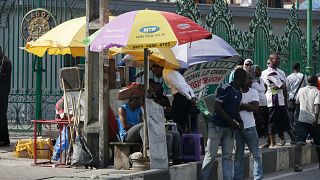Cameroon
An entire neighbourhood buzzing in preparation for a wedding.
In a courtyard in Yaoundé, Cameroon, a family has started a special ceremony. It is henna time for the bride-to-be and young women. They’ll stand out with elaborate or simple henna designs on their skin.
"In Cameroon, henna is called 'sifa'. in It is done before the feast of Ramadan and tabaksi, Aid el Kabir. It is also used on occasions like baptisms and weddings."
After the leaves of the henna tree are dried and powdered, water and oil are added.
Henna is applied in liquid or powder form that is rubbed on the skin.
On Wednesday or Thursday, which usually mark the beginning of wedding festivities that can last up to 4 days, the bride-to-be joins other guests adorned with henna and wearing traditional clothes.
"For my wedding, my mother, my sisters, my cousins all used henna. My grandmother and my aunts drew henna tattoos on me."
The powder is sought-after because it is easily accessible and cheap.
However, what matters the most to some Muslim Cameroonians is the symbolism.
"For the ceremony taking place at the end of the Quranic reading, girls usually do henna because they are happy."
Henna powder also protects women from diseases and infections. They can apply to the hair. It is also used to make facial masks.
In addition to cosmetic and medicinal benefits, some use it for mystical puposes.
The art of Henna has been practiced in South Asia, Africa, and the Middle East for over 5,000 years.





![Colourful Traditional Wedding, Africa’s Biggest Celebration [Travel]](https://static.euronews.com/articles/468157/320x180_468157.jpg)






Go to video
Ruto's $9M mega church sparks outrage amid Kenya's crisis
00:51
Marrakech national festival: honoring the legacy of popular arts
02:55
In Cameroon, Paul Biya's candidacy divides his party
02:20
Young designers grace the runway at Fashion Finest Africa’s show in Lagos
Go to video
Paraguayan town celebrates vibrant Kamba Ra'anga festival with masks, fire and tradition
11:14
Rwanda Walks Away: what’s behind the Central Africa rift? [Business Africa]